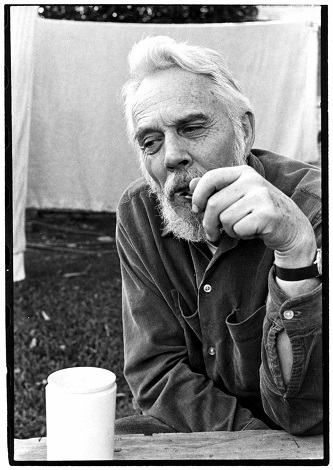American Music Review
Vol. XLIV, No. 1, Fall 2014
By Michael Levine, CUNY Brooklyn College

Harry Partch, Hobo Composer, by S. Andrew Granade (University of Rochester Press, 2014) documents the offbeat music pioneer as ceaselessly looking for the hidden music of hobos, while attempting throughout his career not to be labeled a hobo composer himself. Granade documents Partch’s journey chronologically, from young and itinerant traveler discovering Depression-era America’s vernacular landscape, to his eventual mastery of the hobo’s lingua franca in large-scale works like the stage production Delusion of the Fury, and his documentation of hitchhiker inscriptions in Barstow. To better understand Partch’s influences, the book documents the cultural and musical history of the American hobo from the late 19th century to the 1940s, exploring how the composer’s music engaged and frustrated popular notions of their character. Partch “became a hobo out of necessity and remained one for its freedoms … this is the story of a composer who rejected the tenets of music as he found them and sought to return music to its roots” (110).
Seeking to characterize hobo voices carefully, claims Granade, Partch developed his alternate tunings and instruments not as mere eccentricity, but as a mission to better communicate the idiosyncratic nature of hobo hymns to the Classical music world. This mission resulted in Partch’s extensive use of just intonation, a sizable collection of custom-made instruments, and the entrenched label of America’s ‘hobo composer’ that haunted him throughout his career. The latter half of Partch’s career was, according to Granade, an attempt to cast off this outsider image in favor of representations more palatable to would-be donors and University faculty. “… he altered how he presented his music and theories based on his sense of the prevailing winds of artistic taste” (258).
Juxtaposed against popular representations of the composer, such Richard Wenick’s review of Partch’s “Genesis of a Music” and Philip Blackburn’s essays on Partch’s writing style, Granade attempts to widen Partch’s critical scope beyond the composer’s usual characterization as outsider artist. Granade’s Partch is portrayed as a man in constant conflict between ambitious compositional aims and the poor reception his music frequently encountered in concerts and reviews. The aim here is to reconsider Partch’s legacy, and reexamine our experience when listening to this unique music.
Told with an immense appreciation for a well-regarded but often misunderstood figure in America’s music canon, the book is a needed addition to the limited body of work thus far published on the composer. The hope here is that Granade’s text will allow reconsideration of Harry Partch’s legacy, a composer too often marginalized for his perceived eccentricities, and too often ignored for his significant contributions to America’s art music canon.






